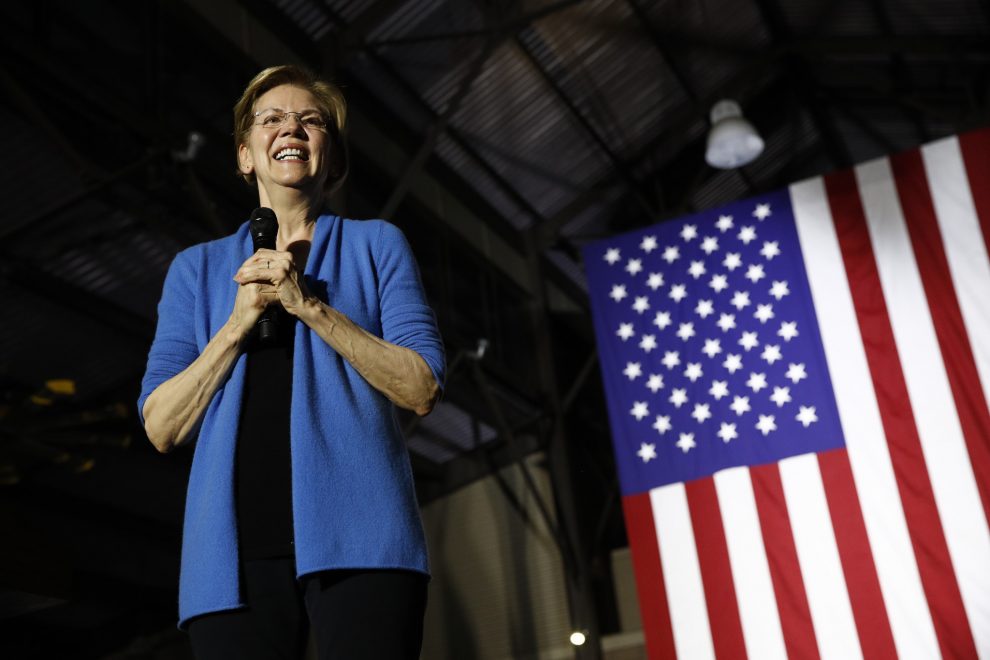Sen. Elizabeth Warren is suspending her presidential campaign, a source familiar with the decision tells NBC News, a bitter blow for a senator who was long seen by prominent Democrats as headed for the White House.
It is unclear whether Warren will endorse another Democratic candidate for president.
The decision ends a frantic year of campaigning for a candidate who branded herself as a progressive fighter from humble beginnings who was ready to take on a broken and corrupt system.
The Massachusetts Democrat wowed crowds with her sharp intellect, her clear prognoses for complex problems, and her endless stream of policy blueprints to tackle them. After a long polling rise over summer that continued into the fall, it was clear Warren’s message was catching on, and she rose to the front of the pack in some polls while avoiding conflict with rivals.
The plan was working. Then it all started to fall apart.
Warren was pummeled on her “Medicare for All” plan by rivals like Pete Buttigieg, who started to peel away white college graduates, a group that formed the core of her base. She responded by releasing a series of detailed financing mechanisms, followed by a plan to transition onto Medicare for All in the third year of her presidency, moving first to establish a “public option” in the first year. The move didn’t placate moderates and it sowed doubts about her among left-leaning voters, who instead moved toward Sanders.
Macron vows nuclear arsenal boost as Europe turns to nukes amid rising global threats
‘Under siege’: Inside the growing radical Islam threat critics say is hiding in plain sight in deep red Texas
Walz-Ellison administration ‘enabled’ Minnesota’s fraud scandal: Guy Benson
NYC Dept of Education employee arrested, charged with murder of Bronx father
Savannah Guthrie returns to ‘Today’ show studio for first time since mother went missing
Iran widens regional war with first strike into Azerbaijan
5 House Oversight Committee Republicans Join with Democrats to Subpoena Pam Bondi in Epstein Probe
As Jasmine Crockett Concedes Texas Senate Primary, Attention Focuses on Radical Dem Who Beat Her
Tom Emmer calls for Tim Walz, Keith Ellison to ‘serve jail time’ if fraud coverup allegations are true
Republican Rep Burgess Owens to retire from Congress when term ends
VIDEO: College Basketball Ref Knocked Out Cold When Players Turn Violent on Court
DOJ Ends Investigation Into Autopen Scandal With Zero Charges, Grand Juries, or Indictments
The ‘woo-woo’ philosophy of Trump’s surgeon general pick
Illegal’s dragging of ICE agent shows the exact danger the officer who shot Renee Good feared, expert says
The Iran Strikes Have Flooded X with So Much AI Disinformation That I Went Crawling Back to Cable News
Meanwhile the crowded field of moderates, most notably the staying power of Joe Biden, made it harder for her to grow her support among the mainstream Democrats who backed Hillary Clinton in 2016. Questions about “electability” dogged her throughout the fall as many voters, haunted by the last presidential election, fretted that the U.S. wouldn’t elect a woman.
It was a quiet, even subconscious fear, thrust into the spotlight right before the Iowa caucuses when news broke of a late 2018 meeting between Warren and Sanders, during which Warren said Sanders told her he didn’t think a woman could beat President Donald Trump. The story led to a January debate stage confrontation, with Sanders denying he said it and Warren sticking by her re-telling of the story. The two later tried to quell the tensions — not wanting to alienate their progressive supporters. But the moment also made it harder for Warren to draw contrasts with her fellow progressive, at a time when it would’ve benefited her to show how she was different.
She wasn’t helped by polls that showed her faring worse than Sanders and Biden against Trump in key states like Michigan and Florida, reinforcing doubts among Democrats whose top concern was the only constant in this primary: finding a candidate who they could trust to defeat Trump.
Trump nourished this fear by repeatedly attacking her as “Pocahontas,” a reference to her decades-long claim of Native American ancestry and her 2018 decision to take a DNA test to prove it.
Macron vows nuclear arsenal boost as Europe turns to nukes amid rising global threats
‘Under siege’: Inside the growing radical Islam threat critics say is hiding in plain sight in deep red Texas
Walz-Ellison administration ‘enabled’ Minnesota’s fraud scandal: Guy Benson
NYC Dept of Education employee arrested, charged with murder of Bronx father
Savannah Guthrie returns to ‘Today’ show studio for first time since mother went missing
Iran widens regional war with first strike into Azerbaijan
5 House Oversight Committee Republicans Join with Democrats to Subpoena Pam Bondi in Epstein Probe
As Jasmine Crockett Concedes Texas Senate Primary, Attention Focuses on Radical Dem Who Beat Her
Tom Emmer calls for Tim Walz, Keith Ellison to ‘serve jail time’ if fraud coverup allegations are true
Republican Rep Burgess Owens to retire from Congress when term ends
VIDEO: College Basketball Ref Knocked Out Cold When Players Turn Violent on Court
DOJ Ends Investigation Into Autopen Scandal With Zero Charges, Grand Juries, or Indictments
The ‘woo-woo’ philosophy of Trump’s surgeon general pick
Illegal’s dragging of ICE agent shows the exact danger the officer who shot Renee Good feared, expert says
The Iran Strikes Have Flooded X with So Much AI Disinformation That I Went Crawling Back to Cable News
Ultimately, it was perhaps the crowded field that hurt her most. National and early state surveys of Democrats heading into the new year showed her leading all rivals on “second choice” preferences. Her campaign sought to turn that into a positive by debuting a new message of unity, pitching her as the candidate best-positioned to bridge the divides between the party’s left and moderate wings.
That, too, backfired. For many voters it was difficult to square “unity” with her “fighter” persona. Previous candidates attempting to bridge that divide had also failed, including Kamala Harris and Cory Booker.
After finishing just fourth and third in Iowa and New Hampshire, respectively, Warren dispensed with that message and revived her more combative persona, launching blistering attacks on new arrival Mike Bloomberg in the Las Vegas debate. She also finally abandoned her non-aggression pact with Sanders. It was a change-up that allies had pushed for for weeks; one that reminded progressives why they were attracted to her in the first place and led to a massive windfall of much-needed donations that kept her campaign afloat.
She followed that up in the Charleston, South Carolina debate the following week, arguing that she’d be more “effective” at passing a progressive agenda because, unlike Sanders, she sweats the details of policy and process.
But Sanders was already in a dominant position by then. After a disappointing Super Tuesday in which she won only a small portion of delegates and lost her home state, her campaign signaled that she was reassessing her path forward.
Her departure from the race means there are no more women in the top tier of the field.
Story cited here.
























